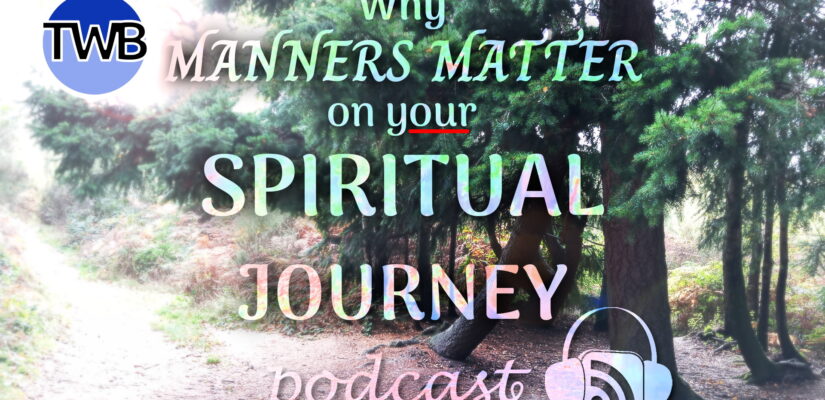
Manners. Why They Are Important for Spiritual Growth
![[39] Manners: Why they matter on a Spiritual Journey. Understanding good versus real manners!](https://i.ytimg.com/vi/sGZfz9WCnQY/maxresdefault.jpg)
Perhaps you’ve heard the saying “Manners maketh the man” but beyond a lyric in a Sting song or a strap line for a movie about Kingsmen, perhaps there is a more fundamental spiritual truth. I explore the topic of “Manners” from a spiritual perspective in this 20 minute podcast. So that you can read along, I’ve included the entire transcript below too.

Introduction
Hello I’m Mark from The Way Back Group and thank you for joining me on what is likely to be an interesting and eye opening topic. Last week the subject of manners from a spiritual perspective came up in one of our online meetups and it got me thinking. You see I had a personal realisation about the spiritual significance of manners a while ago and it really changed my perspective, in a positive way.
Maybe it’s something you already know or perhaps it might be something that surprises you when I share it with you later in this podcast. But the recent video conference certainly made me realise that “Manners” are spiritually more important than many people think and I’m hoping you’ll find out why too. But before I share my own realisations and insights let’s make sure we’re all on the same page about what the word “Manners” means.
Definition
The dictionary gives the following two definitions for the word “Manners”, which are relevant to what we are discussing:
- A person’s outward bearing or way of behaving towards others: for example “her arrogance and pompous manner”.
- Polite or well-bred social behaviour: for example “didn’t your mother teach you any manners?”
Therefore what we are talking about is social behaviour or habits.
Like most words there are other meanings to “Manners” too, such as “the way a thing is done” but that’s not what we’re interested in here. We’re interested in the behaviour side of things.
Now straight away it seems as if we may be on the precipice of falling into the trap of being judgemental about how others appear or behave, so let me reassure you, that’s not the goal of this conversation. Also, it does not matter about gender, age, class, education, wealth, poverty or any other demographic because what I’m talking about is something far more fundamental.
Exercise
So rather than me give you examples of manners, I’m going to invite you to do a little exercise. I want you to relax and notice who comes to mind when I ask you about specific examples of people. It doesn’t matter if you know the person, if they’re on TV, or just someone you saw in the street, just observe what comes up when I ask.
- Who has demonstrated good manners recently?
- Who has demonstrated bad manners recently?
OK, staying relaxed, now think more generally about society. Think of three trends you see in everyday life that you feel are lacking in manners. These may include online, television, or in real life. Please take your time, pause this if you like, you don’t need to write them down, just notice what comes up.
OK so hopefully you’ve got two or three things that show you examples of what you perceive to be bad manners or lacking in manners in society.
You see what I’ve found is that when people start to think about “Manners” everyone has a loose or general idea of what manners are. They can recognise good manners and bad manners and you’ve just reflected upon some examples in your own life. But what manners actually are can be hard to define and so observing the opposite of manners may help bring more clarity.
Now I know some of you may be wondering what this has to do with spirituality, please stay with me, we’re getting there together and I haven’t forgotten the bigger picture, it just really helps to have a firm foundation of understanding and maybe in the process you’re already discovering that your ideas are shifting, growing or coalescing.
What is The Opposite of Manners?
So what words are the opposites of “Manners”? I’m going to say some words which are the autonyms of manners, and as I say these opposites, observe what resonates and any real-life examples of them that you may recall from your own experience:
- Abusive
- Badness
- Beastly
- Crudeness
- Impoliteness
- Impropriety
- Indecency
- Immodesty
- Inelegance
- Rudeness
- Vulgarity
Bad Manners, a Growing Problem
There’s certainly some unpleasant traits listed there, which would suggest that having manners, and therefore not being these things, is about more than just saying “Please” and “Thank you”. This list of words would suggest that going in the direction of not having manners might actually be quite a bad thing and I for one certainly I would not want to be any of those things, would you?
And yet everyone I’ve asked about this can easily find examples in society of all of these negative traits. Furthermore most people seem to agree that “Lack of manners” and therefore all those negative traits seems to be becoming more prevalent in society and evident in mainstream media. What do you think? Would you agree?
Spiritual Focus
OK so I think we’d agree that the opposite of manners is pretty dreadful and that manners are something that we can recognise as a good thing in people, and I hope ourselves too. So where do manners come from? Well most people will probably think of manners as something learnt, which is why the dictionary example quoted “didn’t your mother teach you any manners?”. And it certainly is true that we all learn socially acceptable behaviour from those around us, especially when young. It’s good manners to say “Thank you”. It’s good manners to say “Sorry” etc. And as children we may be rewarded for good manners or punished for bad manners and so we soon learn how to behave.
Except this isn’t really manners. If a person says “Thank you” because they’ve been taught to say thank you in certain situations then does it really have value? Do they really sincerely mean it or are they being polite? Of course it’s far better to be polite than rude and for some people being polite would be an improvement in their manners. But as I said, this is not really manners and I’d like to explain why.
Real Manners
You see if a person has real gratitude then they would say “Thank you” because it comes from their heart, not because they’ve been conditioned to say thank you. Similarly if a person says “Sorry” because they’ve done wrong you might wonder, is it because they’ve been conditioned to say sorry or is it coming from a sincere remorse and out of compassion for those they have wronged? In which case it comes from the heart.
I would say then that “Real” manners are a demonstration of being loving towards others and having a capacity to love. Manners that are the result of social conditioning are a positive thing in society as they promote harmony, but they are not as genuine or sincere, rather they are based on either the carrot, desiring reward, or the stick, fear of reprisal.
So when it comes to “REAL manners” it seems there is more to it than simple learned behaviour, it’s about consideration, compassion and love towards other people. There is one other important word, which I’ll get to shortly. But hopefully you’re starting to see why manners, or rather “Real manners” matter spiritually. Because behind them is love.
Respect
The other important word, which is one of the fundamental things driving real manners is “RESPECT”. Now if you’re new to my podcasts or The Way Back then you might not have heard about The Six Virtues and I’ll put some links below. But you can also check out our podcast episodes 18, 36 and 37 or their corresponding YouTube videos to find out more. For now though all you need to understand is that there are a number of key Virtues of character which, when developed, help your soul awaken to its potential and ultimately make you more good, raising your vibration.
Respect is one if these key virtues and its easy to see respect in action when you think about showing manners to others. But, and this is important, it also applies to yourself. Let me explain a bit more by going back to the list of words that represent what happens when a person lacks manners: When a person is crude, indecent, immodest, inelegant or vulgar in thought, action, speech, or appearance, what they are really demonstrating at a core level is that they lack self-respect, irrespective of whether there is anyone there to witness it or be offended by it.
“So real manners affect other people but they are also a mirror that you hold up to yourself.”
I’d like to share a story with you that was given to us by a woman on that video conference. Years ago she had a friend who was being treated very badly by her family and was also having a very hard time being abused and disrespected in her work place. They were discussing the situation and despite all the disrespect and lack of manners being demonstrated towards her she turned to this woman and said with determination “But they will have my respect!” It left a lasting impression upon her and whoever their friend was I salute them because they really get it. They weren’t about to lower themselves to the standards of those who oppress them.
You see REAL Manners are all about YOU and your choices; in fact sometimes they may be the only thing you are in control of and all you have is a choice about is how you react to others.
When we truly respect ourselves it means that we have love of self which is a beautiful and spiritual thing, not to be confused with narcissism or vanity. When we have love within then we have the potential to love others and so our gratitude, compassion and respect for others is sincere, coming from the heart, rather than learned reactionary behaviour.
The more we develop respect for ourselves and others, in equal measures then the more our soul grows in virtue and the more we can come from our heart in our relationship interactions, both internal and external. Then we have real manners because of the love we have for self and others and these manners are the outward resonance of our inner respect.
Before we all start becoming advocates of self-respect let me share a wise caution on the idea of “Self-respect”. On the radio and news I often hear people, especially if they have been the victim of suppression of any kind, talking about “Self-respect” or “Being respected”. But in their voice is not love but anger or resentment about what has been done to them. Also in pop-culture respect is often used to acknowledge something negative, for example a thug gaining the respect of a gang by committing a crime. None of this is respect.
Respect is founded in love and is yin. It is never about being hostile, aggressive or overly assertive, though I do recognise that a person who is being abused or disrespected may need to set boundaries. And that act of setting boundaries is only a stepping stone though and that action of resistance is not a demonstration of respect, rather it is doing what is right. Hopefully what you will now recognise is that even in a hostile situation real manners matter and true respect is founded in love not hate.
Everything we think, do, or say has energy and another way of thinking about manners is: “Is the energy I am projecting towards others positive or negative?” Real manners and Respect are always positive, being rooted in love. Shouting at someone that “You need to respect me!” is not positive.
Soul Development
But why does this matter? Well think of your soul as your score card in life and everything you do that is positive raises its vibration and everything you do that is negative drops it and may also lead to you becoming a more negative person and all the dis-ease and problems that entails. Given a choice wouldn’t you always strive for what is positive. Now consider that when the situation is challenging and you chose to be positive then you get more points because you’re doing the right thing even though its hard. Now we know that real manners are a sign that your soul-score-card is going up.
Learned Manners Versus Real Manners
OK so I’ve been drawing a line between learned manners which are conditioned behaviours and real manners, which come from the heart. So you might be wondering do learned manners matter?
Absolutely because in order for you to learn manners it means that someone, perhaps parents, grandparents or a career had to teach you. Since they did the work to teach you, they were demonstrating their own level of virtue too. You see if they chose, whether consciously or not, to teach you they were saying “Manners matter”. If they chose not to then they were demonstrating where they were in life but also they would then had to have live with you as a child that had no manners, and that would have had an effect on the energy within the home too. So every choice they made affected them, and you.
But whether you were taught manners or not, love and the heart is something innate in all good humans and so whether you can articulate it or not, If you can recognise real manners in others then you can make that choice to work on them yourself. Similarly, would you choose to teach good manners to someone or at the very least demonstrate them to others to lead by example?
The Simple Realisation
The realisation I was given, that I alluded to at the start of this podcast, was that:
“Manners are for the benefit of others.”
Pure and simple.
Therefore if you don’t show manners, whether learned or real, then you are demonstrating to your environment that “You don’t care”. Imagine a society where everyone cares… now imagine a society where no one cares… Which would you rather live within? This has nothing to do with morals, culture or any transient idealism. Caring is about love.
Wrapping up
So we’re all in this crazy wonderful thing called society together. Right near the start I asked you to think of people and situations where there are bad manners in society and we’re seeing many examples of lack of manners being promoted by the media and becoming mainstream and “Socially acceptable” in everyday life.
It seems to be shifting so quickly it makes you wonder if its being orchestrated or is just a natural reaction to some sort of break down in the fabric of society? Perhaps we’ll never know but the good news is we don’t need to know why, all we need is a desire to do something about it and that brings me back to the fact that good manners, therefore respect, is all about you.
“Everyday you have so many choices and collectively the net result of your choices equals your power within society.”
Let me elaborate, you see quite a while ago as my experience on my own spiritual journey deepened I came to understand that everything has energy. The music you listen to, the food you eat, the films you watch, the books you buy, the television you view, the radio you listen to, the shops you buy stuff in.
So keeping it very simple, is the energy of something you are choosing positive or negative? Now that’s hard to determine sometimes, but if I were to say to you “Is this thing demonstrating real manners?” Then that might be easier to understand and help you make better choices.
Manners in Real World Examples
Let’s look at some real examples:
Who/What Do I Support With My Money?
I recently stopped using a shop because I overheard the owner saying something very bad and indecent. Now although it was not aimed at me I realised that I was being presented with a simple choice. Do I want to financially support this person by continuing to buy products from them? I stopped shopping there and it felt like the right thing to do.
Demonstrating that Manners Matter to Others
Another example. I was on a campsite recently and a good friend joined me with his young adolescent son and a few of his son’s friends. They started playing football and their language quickly turned foul and profane. I called them over and said “I don’t mind whatever language you use at home, but you’ve been invited here as my guest and there are young children in these other tents and motorhomes, so I am asking you not to swear while you are here, to show respect to the other people around you.” you know what, they stopped swearing and I even heard them cautioning each other when they slipped up. The important thing for me was firstly that I was non-confrontational and came from the heart, that secondly, I recognised that the situation represented a choice and although it took me out of my comfort zone I did the right thing.
Now with this last example I want to stress that I’m not saying you should confront others, remember it is all about you. That situation was about me speaking truth, I was not attached to the outcome and if they carried on swearing, so be it, that’s their choice, but I had demonstrated my values.
What Do I Give My Attention Towards?
A final example is that I no longer bother with films, tv, books, music or anything that is demonstrating the opposite of good manners. If there’s swearing or angry, aggressive or abusive content then I’m not going to give it my money or more importantly my attention and energy.
Imagine a Change
Take a moment to imagine what would happen if people stopped buying products that were promoted by crude, vulgar, indecent, or aggressive advertising? Imagine the changes in society if people stopped watching films that were promoting bad manners? The studios would soon stop churning them out. This of course raises the question of are manners in society being degraded by such content?
But whatever the answer to that is, what I’m hopefully inspiring you to realise is that you have a choice and when you choose good and real manners then you are becoming more spiritual and awake. It’s all about you.
So a genuine and heart felt thank you for listening to this podcast and giving it your time and to all of those who share the podcasts, I’m really grateful. And if you’d like to discover more, I invite you to head on over to thewaybackgroup.org. Thank you.




